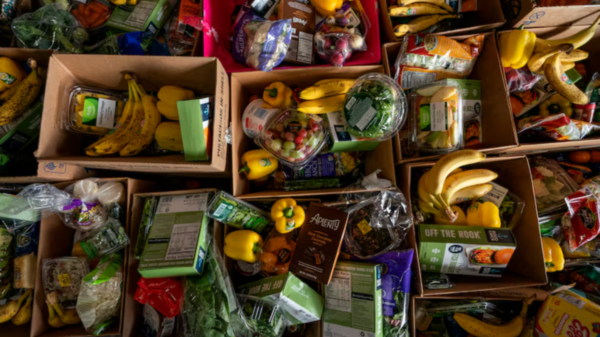
Need a healthy way to kick off the new year? You’re in luck.
As the calendar turns, cultures across the world focus on good fortune and associate all kinds of foods with it. Here’s a look at which are healthiest – and how to handle those that are less so.
Black-eyed peas
In the American South, it’s not New Year’s without black-eyed peas, which are actually a type of bean. In some areas, they’re served with rice in a dish called Hoppin’ John.
James Shikany, endowed professor of cardiovascular disease at the University of Alabama at Birmingham, said black-eyed peas themselves are a healthy food, “but it depends on how they’re prepared.”
On their own, black-eyed peas are full of fiber and packed with iron, thiamin and other nutrients. But Shikany, a nutritional epidemiologist and lead author of a 2015 study in Circulation about the traditional Southern diet, said they often are made with a lot of salt and fatty meat. Excess sodium can increase your risk of high blood pressure, and saturated fat can raise LDL (“bad”) cholesterol, which can boost your risk of heart disease.
Collard greens
“It’s the same story,” Shikany said. Collard greens – said to be symbolic of folded cash – are full of fiber, vitamins and iron. “Most greens, in general, have a lot of beneficial nutrients,” he said.
But traditional recipes call for the addition of cured meat, such as ham, fatback or bacon, “which also are high in sodium and are things, which again, we would discourage,” Shikany said. Overcooking also can lower their nutritional value.
Lentils
In Italy, Nigeria, Brazil and elsewhere, it’s traditional to eat lentils. Anna Maria Siega-Riz, dean of the School of Public Health and Health Sciences at the University of Massachusetts Amherst, said that lentils, like black-eyed peas, are considered lucky because they resemble coins.
Lentils are great on their own, full of nutrients. But many recipes call for them to be cooked with fatty sausage.
Lucky for us, each of the above foods can be prepared in healthy ways, Siega-Riz said. For collard greens or black-eyed peas, instead of traditional fatback, look for leaner cuts of pork. Vegetarian recipes abound. “There’s also wonderful recipes for combining lentils with carrots and different vegetables, so you can create a lentil soup, which also increases the nutritional value of that food,” she said.
Grapes
Many Latin American cultures celebrate the new year by eating 12 grapes. The tradition is traced to Spain, where a grape is eaten with each chime of the clock at midnight. “You’re eating one grape for each month to have a prosperous new year,” Siega-Riz said.
As lucky foods go, “grapes are probably one of the healthiest,” she said. But in her Cuban-Italian family, they don’t rush things: You get all day to eat your dozen grapes.
Pomegranates
In Greece and Turkey, smashing pomegranates brings luck – which might be satisfying but won’t do much nutritionally. Eating them is a great idea, though, Siega-Riz said. They’re full of healthy antioxidants and flavonoids.
Fish
Whether they celebrate the new year Jan. 1 or mark the Lunar New Year (which in 2023 arrives on Jan. 22), people around the world eat fish for good fortune. That’s the case in China, said Ka Hei Karen Lau, a registered dietitian and certified diabetes care and education specialist at the Joslin Diabetes Center’s Asian American Diabetes Initiative in Boston.
“The word ‘fish,’ in Chinese, sounds like ‘you have remaining,'” suggesting you’ll have more than enough to get you from one year to the next, said Lau, who noted that China includes many cultures and lucky traditions.
“We usually make a whole fish, with bones, with the head, with the tail – everything,” she said. Typically, it’s steamed. So “generally, it’s quite healthy.”
Dumplings
Many will welcome the Lunar New Year with dumplings. “It looks like a piece of gold,” suggesting good fortune, said Lau, who treasures her tradition of gathering with friends to wrap and boil dumplings.
Dumplings often are made from white-flour dough and filled with vegetables or fatty pork. To make them healthier, she suggests using a 50-50 mix of white and whole wheat flour for the dough. Similarly, you can reduce fat by mixing in leaner pork. She’s also made dumplings with chicken and, for her vegetarian friends, tofu.
Spring rolls
Stuffed with pork and cabbage, traditional spring rolls are deep-fried to look like gold bars, Lau said. To keep things healthy, she suggested limiting yourself to one or two, “instead of having, like, five of them.”
Tamales
Holiday food is not just about nutrition, Lau said. It’s about tradition, and bonding with friends and family. “Sometimes it’s not just about what’s in the ingredients, but that time you can chat.”
In Mexican culture, tamales serve as such a social focal point. Tamales trace their history to the Mayans and Aztecs, who served them as offerings to their gods. Now they are a Christmas and New Year’s tradition, where families gather to stuff husks with cornmeal, meat, vegetables or cheese.
“I love tamales,” Siega-Riz said, but what they’re filled with makes a huge difference. To make them healthier, “you could use a leaner cut of meat, or use less meat, and combine maybe more vegetables,” consider using a skim-milk cheese or replace lard with vegetable shortening.
You don’t have to deny yourself the sweet treat of tamales dulces, or any other less-healthy food, Siega-Riz said. Just enjoy them in moderation.
“These foods are comfort foods,” she said. “They’re part of your culture. You’re sharing them with one another during a very special time of the year. And things in moderation are always going to fit in our dietary patterns.”
As Lau put it, if you’re eating healthy most of the time, taking a little holiday break is not going to break your overall health. “It’s New Year’s Day – go ahead and enjoy that day,” she said. “Just try not to linger and make it New Year’s Week or New Year’s Month.”
If you have questions or comments about this American Heart Association News story, please email editor@heart.org.









You must be logged in to post a comment Login